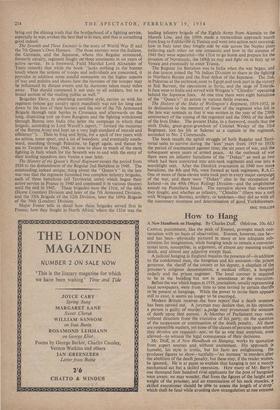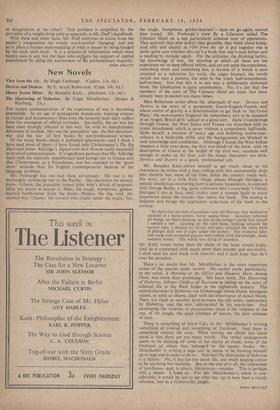How to Hang
A New Handbook on Hanging. By Charles Duff. (Melrose. 10s. 6d.) CAPITAL punishment, like the peak of Everest, prompts much con- versation with no basis of observation. Everest, however, can be— and has been—physically pictured in more or less adequate sub- stitution for imagination, while hanging tends to remain a conversa- tional term, susceptible, in argument, of almost any meaning except death, and almost any adjective except final.
A judicial hanging in England requires the presence of—in addition to the condemned man, the hangman and his assistant—the prison governor, the sheriff of the county or his deputy, a chaplain of the prisoner's religious denomination, a medical officer, a hospital orderly and the prison engineer. The local coroner is required to be in the building but not in attendance at the execution.
Before the war which began in 1939, journalists, usually representing local newspapers, were from time to time invited by certain sheriffs to be present at hangings. While the power to invite them appears still to exist, it seems no longer to be exercis9d. Modern Britain receives the bare report that a death sentence has been carried out. A juryman may declare that, in his opinion, a person is guilty of murder: a–judge may pronounce the sentence of death upon that person. A Member of Parliament may vote, without direction from the executive of his party, on the question of the suspension or continuation of the death penalty. All these are responsible matters, yet none of the classes of persons upon whom they devolve are required—nor, so far as one may ascertain, even allowed—to witness the legal consequence of their decisions.
Mr•. Duff, in A New Handbook on Hanging, works by quotation from expert sources and without excitement. His approach is humane, his style is ironic, but his facts are enlightening. He produces figures to show—tactfully—'no increase' in murders after the abolition of the death penalty, but these may, if the reader wishes, be ignored. He is at pains to explain that hanging is not a merely mechanical act but a skilled operation. How many of Mr. Barry's one thousand four hundred rival applicants for the post of hangman were aware, we may wonder, that from the figures of the height and weight of the prisoner, and an examination of his neck muscles, a skilled executioner should be able to assess the length of a' drop' which shall be fatal while avoiding slow strangulation at one extreme With these and other facts, Mr. Duff contrives to excise from the reader's imagination the woolly word-symbol 'hanging' and put in its place a human understanding of what is meant by being hanged by the neck until dead. It, is a process of information which must inspire awe in any but the man who explains his support of capital punishment by citing the narrowness of his parliamentary majority.
JOHN ARLOTT



































 Previous page
Previous page